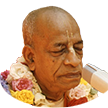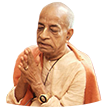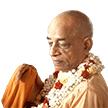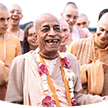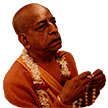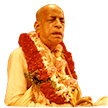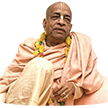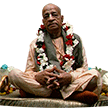Vedic Mantras - an essential subject: Difference between revisions
(Created page with "Category:Essential Subjects <!----------------------- edit below this line -----------------------> <!------------------------ begin introduction text below --------------...") |
(Vanibot #0041: Moves Choose Another box to the end) |
||
| Line 2: | Line 2: | ||
<!----------------------- edit below this line -----------------------> | <!----------------------- edit below this line -----------------------> | ||
<!------------------------ begin introduction text below ------------------------> | <!------------------------ begin introduction text below ------------------------> | ||
he Vedic mantras are received not by learning Sanskrit, but by hearing from the authorized person. Therefore it is called śruti. It is in Sanskrit because there was no other language. Sanskrit was the only language. So now they're being translated into English. So it doesn't matter whether it is in Sanskrit or English, one has to learn it by hearing from the proper person. The power of the vedic mantras are so powerful that the animals put into the sacrificial fire. By Vedic mantra, he was given new life. But at the present moment such expert priests and brāhmaṇas are not available. Therefore it is stopped. Animal sacrifice is stopped. Because it is Kali-yuga. Nobody is reading, cultivating Vedic mantras. So in this age, this mantra is called mahā-mantra, chant Hare Kṛṣṇa. That's all. All Vedic mantras are now gone to hell. You see? Nobody can properly chant Vedic mantras and take the benefit out of it. But this mantra, any way you chant, neglectfully or properly, chant Hare Kṛṣṇa and the result is there. Therefore Caitanya Mahāprabhu said, nāsty eva nāsty eva nāsty eva gatir anyathā. There is no other alternative, no other alternative, no other alternative, kalau, in this age. So the Vedic mantra is now gone. This is also Vedic mantra, but this is Vedic mahā-mantra, the greatest of all mantras. Yes. So sacrifice everything and chant this mantra and go to Kṛṣṇa, back to Godhead. | |||
Srila Prabhupada's books, lectures, conversations and letters offer a comprehensive presentation of this essential subject as seen in the Vaniquotes '''[[Vaniquotes:Category:Vedic Mantras|Vedic Mantras]]''' category. An introduction from his books is given below in the following | Srila Prabhupada's books, lectures, conversations and letters offer a comprehensive presentation of this essential subject as seen in the Vaniquotes '''[[Vaniquotes:Category:Vedic Mantras|Vedic Mantras]]''' category. An introduction from his books is given below in the following 8 quotes. | ||
<!-------- end introduction text and don't touch next three lines ---------> | <!-------- end introduction text and don't touch next three lines ---------> | ||
== Quotes from Srila Prabhupada's books == | == Quotes from Srila Prabhupada's books == | ||
<!----------------- edit quote boxes below this line -----------------> | <!----------------- edit quote boxes below this line -----------------> | ||
{{VaniQuotebox| | {{VaniQuotebox|A person may think that there is no direct statement about Krsna in the Upanisads, but the fact is that the Vedic mantras cannot be understood by people with mundane senses|Before the creation of the cosmic manifestation, the Supreme Personality of Godhead possessed His totally transcendental mind and eyes. That Supreme Personality of Godhead is Kṛṣṇa. A person may think that there is no direct statement about Kṛṣṇa in the Upaniṣads, but the fact is that the Vedic mantras cannot be understood by people with mundane senses. '''(Caitanya-caritāmṛta, Madhya-līlā 6.147)'''}} | ||
{{VaniQuotebox| | {{VaniQuotebox|According to a verse of the Vedic mantras, parasya saktir vividhaiva sruyate: the Supreme Personality of Godhead has different varieties of energies. Sakti is feminine, and the Lord is purusa, masculine|According to a verse of the Vedic mantras, parāsya śaktir vividhaiva śrūyate: (Cc. Madhya 13.65, purport) the Supreme Personality of Godhead has different varieties of energies. Sakti is feminine, and the Lord is puruṣa, masculine. It is the duty of the female to serve under the supreme puruṣa. As stated in Bhagavad-gītā, all living entities are marginal energies of the Supreme Lord. Therefore it is the duty of all living entities to serve this Supreme Person. '''(Śrīmad-Bhāgavatam 4.7.59)'''}} | ||
{{VaniQuotebox| | {{VaniQuotebox|According to the Vedic mantras the Supreme Lord is the supreme master of innumerable living entities|The living entities are also eternal and are also living forces, but they are very minute in quantity, whereas the Supreme Lord is the supreme living force and the supreme eternal. The supreme eternal never accepts a body of a temporary material nature, whereas the living entities, who are part and parcel of the supreme eternal, are prone to do so. Thus according to the Vedic mantras the Supreme Lord is the supreme master of innumerable living entities. '''(Caitanya-caritāmṛta, Ādi-līlā 7.10)'''}} | ||
{{VaniQuotebox| | {{VaniQuotebox|All drugs, creepers and vegetables are the hairs on your (the Lord) body, the Vedic mantras like Gayatri are the seven layers of your body, and the Vedic religious system is the core of your heart|O lord, you are the three Vedas personified. The seven seas are your abdomen, and the mountains are your bones. All drugs, creepers and vegetables are the hairs on your body, the Vedic mantras like Gāyatrī are the seven layers of your body, and the Vedic religious system is the core of your heart. '''(Śrīmad-Bhāgavatam 8.7.28)'''}} | ||
{{VaniQuotebox| | {{VaniQuotebox|All the Vedas worship the transcendental form of the Lord. In the Vedic mantras the devotees request the Lord to remove the glaring effulgence because it covers His real face. That is the version of the Isopanisad|All the Vedas worship the transcendental form of the Lord. In the Vedic mantras the devotees request the Lord to remove the glaring effulgence because it covers His real face. That is the version of the Īśopaniṣad. The Lord has no material form, but His form is always understood in terms of the Vedas. '''(Śrīmad-Bhāgavatam 3.13.26)'''}} | ||
{{VaniQuotebox| | {{VaniQuotebox|All the Vedic mantras, or sruti-mantras, are included in this verse spoken by Lord Brahma, for Brahma and his followers, the Brahma-sampradaya, understand the Supreme Personality of Godhead through the parampara system|All the Vedic mantras, or śruti-mantras, are included in this verse spoken by Lord Brahmā, for Brahmā and his followers, the Brahma-sampradāya, understand the Supreme Personality of Godhead through the paramparā system. We have to gain understanding through the words of our predecessors. There are twelve mahājanas, or authorities, of whom Brahmā is one. '''(Śrīmad-Bhāgavatam 8.5.26)'''}} | ||
{{VaniQuotebox| | {{VaniQuotebox|Although Srila Suta Gosvami was a preacher of the first order, he did not bother much about the metrical pronunciation of the Vedic mantras. But that does not mean that Srimad-Bhagavatam is of less importance than the Vedic mantras|The only differences are that the Vedic mantras mostly begin with praṇava oṁkāra and that it requires some training to pronounce the metrical accent, without which the mantras cannot be successfully chanted. Although Śrīla Sūta Gosvāmī was a preacher of the first order, he did not bother much about the metrical pronunciation of the Vedic mantras. But that does not mean that Śrīmad-Bhāgavatam is of less importance than the Vedic mantras. '''(Śrīmad-Bhāgavatam 1.4.13)'''}} | ||
{{VaniQuotebox| | {{VaniQuotebox|Although the names of Indra and Agni are sometimes uttered in the Vedic mantras (indraya svaha, agnaye svaha), the Vedic sacrifices are actually performed for the satisfaction of Lord Visnu|If husband and wife are attached to one another for advancement in Kṛṣṇa consciousness, their relationship of cooperation is very effective for such advancement. Although the names of Indra and Agni are sometimes uttered in the Vedic mantras (indrāya svāhā, agnaye svāhā), the Vedic sacrifices are actually performed for the satisfaction of Lord Viṣṇu. As long as one is very much attached to material sense gratification, the worship of the demigods or the worship of one's husband is recommended. '''(Śrīmad-Bhāgavatam 6.18.33-34)'''}} | ||
<!----------------- edit quote boxes above this line -----------------> | <!----------------- edit quote boxes above this line -----------------> | ||
| Line 30: | Line 30: | ||
'''Vedic Mantras - [[Vaniquotes:Category:Vedic Mantras|explore more within this category]]'''. | '''Vedic Mantras - [[Vaniquotes:Category:Vedic Mantras|explore more within this category]]'''. | ||
{{EsentialSubjectTotal}} | {{EsentialSubjectTotal}} | ||
<div style="float:left;"> | |||
{{EssentialSubjectnav}} | |||
</div> | |||
__NOTOC__ | __NOTOC__ | ||
__NOEDITSECTION__ | __NOEDITSECTION__ | ||
Latest revision as of 18:07, 22 November 2020
he Vedic mantras are received not by learning Sanskrit, but by hearing from the authorized person. Therefore it is called śruti. It is in Sanskrit because there was no other language. Sanskrit was the only language. So now they're being translated into English. So it doesn't matter whether it is in Sanskrit or English, one has to learn it by hearing from the proper person. The power of the vedic mantras are so powerful that the animals put into the sacrificial fire. By Vedic mantra, he was given new life. But at the present moment such expert priests and brāhmaṇas are not available. Therefore it is stopped. Animal sacrifice is stopped. Because it is Kali-yuga. Nobody is reading, cultivating Vedic mantras. So in this age, this mantra is called mahā-mantra, chant Hare Kṛṣṇa. That's all. All Vedic mantras are now gone to hell. You see? Nobody can properly chant Vedic mantras and take the benefit out of it. But this mantra, any way you chant, neglectfully or properly, chant Hare Kṛṣṇa and the result is there. Therefore Caitanya Mahāprabhu said, nāsty eva nāsty eva nāsty eva gatir anyathā. There is no other alternative, no other alternative, no other alternative, kalau, in this age. So the Vedic mantra is now gone. This is also Vedic mantra, but this is Vedic mahā-mantra, the greatest of all mantras. Yes. So sacrifice everything and chant this mantra and go to Kṛṣṇa, back to Godhead.
Srila Prabhupada's books, lectures, conversations and letters offer a comprehensive presentation of this essential subject as seen in the Vaniquotes Vedic Mantras category. An introduction from his books is given below in the following 8 quotes.
Quotes from Srila Prabhupada's books
Vedic Mantras - explore more within this category.
Vanipedia has now over 903 introductory articles compiled from Srila Prabhupada's books under the series titled Essential Subjects. All these articles can be seen in the Table of Content on the right side of this article and also here in this Umbrella Category. Browse through them to relish the breadth and depth of Srila Prabhupada's teachings - There is a subject for everyone.
